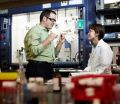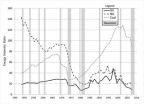(Press-News.org) URBANA – The University of Illinois scientists who linked eating tomatoes with a reduced risk of prostate cancer have developed a tool that will help them trace the metabolism of tomato carotenoids in the human body. And they've secured funding from the National Institutes of Health to do it.
"Scientists believe that carotenoids—the pigments that give the red, yellow, and orange colors to some fruits and vegetables—provide the cancer-preventive benefits in tomatoes, but we don't know exactly how it happens," said John W. Erdman, a U of I professor of human nutrition.
The researchers will use isotopic labeling of three tomato carotenoids with heavier carbon atoms than are commonly seen in nature, which will allow tracking of the tomato components' absorption and metabolism in the body, he said.
"We have two questions we'd like to answer. First, are the carotenoids themselves bioactive, or are their metabolic or oxidative products responsible for their benefits? Second, is lycopene alone responsible for the tomato's benefits, or are other carotenoids also important?" he said.
Previous Erdman animal studies have shown that whole tomato powder, which contains all of the fruit's nutritional components, is more effective against prostate cancer than lycopene alone.
"Lycopene, which gives the fruit its red color, has received a lot of attention—it's even advertised as an ingredient in multivitamin supplements, but two little-known colorless carotenoids, phytoene and phytofluene, probably also have benefits," said Nancy Engelmann, a doctoral student in Erdman's laboratory who helped to develop the new method.
Engelmann learned to optimize the amount of carotenoids in tomato cell cultures by treating already high-achieving tomato varieties with two plant enzyme blockers. The best performers were then chosen for culturing and carbon-13 labeling, she said.
The scientists grew tomato cells with non-radioactive carbon-13 sugars, yielding carbon molecules that are heavier than the 12-carbon molecules that exist elsewhere, Erdman said.
"These heavy carbon molecules are then incorporated into the carotenoids in the tomato cell cultures. The result is that researchers will be able to track the activity of lycopene, phytoene, and phytofluene and their metabolites," he said.
Thanks to NIH funding, U of I researchers and colleagues at The Ohio State University are preparing to use this new tool to study carotenoid metabolism in humans.
"It's exciting that we now have the means to pull off this human study. It's work that should move us forward in the fight against prostate cancer," he said.
###
The research was published in the September 2010 issue of the Journal of Agricultural and Food Chemistry. Co-authors include the U of I's Engelmann, Randy B. Rogers, S. Indumathie Rupassara, Peter J. Garlick; Mary Ann Lila of the U and I and the North Carolina State Plants for Human Health Institute, and Jessica K. Campbell, now with The Bell Institute of Health and Nutrition at General Mills.
END
With the emergence of an epidemic of obesity and type 2 diabetes (DM) throughout the world, the association of lifestyle habits that may affect the risk of metabolic diseases is especially important. Most prospective studies have shown that moderate drinkers tend to have about 30% lower risk of developing late onset diabetes than do non-drinkers, and moderate drinkers also tend to be at lower risk of developing metabolic syndrome (MS). A cross-sectional analysis of 6172 subjects age 35 -75 in Switzerland related varying levels of alcohol intake to the presence of DM, ...
Through an innovative use of cell phone records, researchers at UCLA, the University of Miami and Cal State, Fullerton, have found that women appear to avoid contact with their fathers during ovulation.
"Women call their dads less frequently on these high-fertility days and they hang up with them sooner if their dads initiate a call," said Martie Haselton, a UCLA associate professor of communication in whose lab the research was conducted.
Because they did not have access to the content of the calls, the researchers are not able to say for sure why ovulating women ...
DURHAM, N.C. – As the U.S. Environmental Protection Agency weighs whether to define coal ash as hazardous waste, a Duke University study identifies new monitoring protocols and insights that can help investigators more accurately measure and predict the ecological impacts of coal ash contaminants.
"The take-away lesson is we need to change how and where we look for coal ash contaminants," says Avner Vengosh, professor of geochemistry and water quality at Duke's Nicholas School of the Environment. "Risks to water quality and aquatic life don't end with surface water contamination, ...
DURHAM, N.C. – Long a staple of nature documentaries, the somewhat bizarre development of a grub-like pink marsupial embryo outside the mother's womb is curious in another way.
Duke University researchers have found that the developmental program executed by the marsupial embryo runs in a different order than the program executed by virtually every other vertebrate animal.
"The limbs are at a different place in the entire timeline," said Anna Keyte, a postdoctoral biology researcher at Duke who did this work as part of her doctoral dissertation. "They begin development ...
DURHAM, N.C. -- Humans are known to play it safe in a situation when they aren't sure of the odds, or don't have confidence in their judgments. We don't like to choose the unknown.
And new evidence from a Duke University study is showing that chimpanzees and bonobos, our closest living primate relatives, treat the problem the same way we do.
In studies conducted at the Tchimpounga Chimpanzee Sanctuary in Republic of Congo and Lola ya Bonobo Sanctuary in Democratic Republic of Congo, researchers found the apes prefer to play it safe when the odds are uncertain.
Graduate ...
A national conversation continues about the best ways to improve both the quality of medical care and to contain costs. So far, developing quality measurements has focused on primary care or highly prevalent, chronic conditions such as asthma and diabetes. But what about brain disorders? To date, the number of measures that apply to neurologic care has been limited.
The American Academy of Neurology (AAN), an association of more than 22,500 neurologists and neuroscience professionals, reached out to a group of neurologists to develop such a set of measurements. Led ...
If fossil fuels burn completely, the end products are carbon dioxide and water. Today the carbon dioxide is a waste product, one that goes into the air — adding to global warming; or the oceans — acidifying them; or underground — with as yet unknown consequences.
But it's not impossible, says Liviu M. Mirica, PhD, assistant professor of chemistry at Washington University in St. Louis, to drive things the other way, turning carbon dioxide into fuels such as methanol or hydrocarbons.
Until now reversing combustion has been a loser's game, because making carbon dioxide ...
An overlooked cause of the economic recession in the U.S. is a decade long decline in the quality of the nation's energy supply, often measured as the amount of energy we get out for a given energy input, says energy expert Carey King of The University of Texas at Austin.
Many economists have pointed to a bursting real estate bubble as the initial trigger for the current recession, which in turn caused global investments in U.S. real estate to turn sour and drag down the global economy. King suggests the real estate bubble burst because individuals were forced to pay ...
DALLAS, Nov. 29, 2010 — Women with a history of migraine headache with aura (transient neurological symptoms, mostly visual impairments) are at increased risk of stroke. However, according to new research reported in Circulation: Journal of the American Heart Association stroke events in women with migraine with aura are more likely to have mild or no disability compared to those without migraine.
In a new analysis of the Women's Health Study involving 27,852 women over 13.5 years, researchers found those who have migraine with aura and who experience an ischemic stroke ...
TEMPE, Ariz. – Glass is something we all know about. It's what we sip our drinks from, what we look out of to see what the weather is like before going outside and it is the backbone to our high speed communications infrastructure (optical fibers).
But what most people don't know is that "glass transitions," where changes in structure of a substance accompanying temperature change get "frozen in," can show up during cooling of most any material, liquids through metals. This produces "glassy states," of that material – exotic states that can be unfrozen and refrozen by ...

